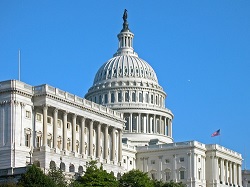Inside D.C.
Trump and pointless tariff fatigue

Someone has to tell the president, “Enough with the tariff threats” with U.S. trading partners. Agriculture can’t afford the outcome.
I was wading through the he-said, she-said articles this week generated by the prospect of a U.S.-EU bilateral trade deal – President Trump says ag is on the table, EU Trade Commissioner Cecilia Malmstrom, says “no way” – and I stumbled on a very disheartening note.
I’d ventured into the arena of dueling government airline subsidies between the U.S. and the EU – Boeing versus Airbus – and once again, Trump threatens to slap tariffs on EU auto exports to the U.S. The EU released just today its proposed $12 billion in retaliatory tariffs should the U.S. make good on its threat, and at the top of the EU list sits food and agriculture imports from this country.
Two questions come to mind: Why are tariffs Trump’s go-to foreign policy ploy? When is ag going to wake up to the fact the president seems to pay lip service to the importance of agriculture while routinely throwing us under the bus while destroying export markets it took decades and millions of dollars to develop?
My favorite administration response came a year or so ago when ag dared to complain about tariff wars. “Sell to someone else,” said Commerce Secretary Wilbur Ross, as if a producer can find a market these days that isn’t on the president’s tariff target list. Congress is wisely trying to enact legislation to limit a president’s power to tariff imports for “national security” reasons.
Think about it. In about 18 months, the president has slapped 10-50% tariffs on imported solar panels, washing machines, steel, aluminum and, of course, 818 separate categories of Chinese exports are currently subject to a 25% tariff. Morgan Stanley estimated a year ago nearly 5% of U.S. imports are tariffed, so that total must have increased. Nearly every U.S. trading partner is now paying some form of tariff on an export to the U.S. Those same nations have retaliated with levies of their own on U.S. products, and for the most part, those taxes are aimed at agriculture, primarily unprocessed grains, oilseeds, meats, fruits, vegetables, nuts, dairy and so on.
When the president decided there was sufficient national security justification to use executive authority to whack the world with 25% tariffs on imported steel and 10% tariffs on imported aluminum, he made a big deal out of exempting our “allies and partners.” Australia, Canada, Mexico, the EU and a few other nations were posted to a temporary exemption list. Then the U.S yanked the exemptions with nary an explanation for the action. Today, only Australia and Argentina are exempt.
Now U.S. agriculture is trying to compete in overseas markets burdened by retaliatory tariffs on imported agricultural products. To date, Canada, the EU, Mexico, China and lesser nations have slapped retaliatory tariffs on U.S. ag imports.
Meanwhile, the White House is trying to finalize new trade deals with Canada and Mexico – the U.S.-Mexico-Canada Agreement (USMCA) – get a quick ag-only bilateral with Japan while negotiating what’s fast becoming a face-saving exercise with China to end those tariff wars, all the while jump-starting a bilateral trade deal with the EU that will likely never happen.
The one condition all these countries place on signing a final treaty? The U.S. must cancel its steel/aluminum tariffs.
The White House is silent, and while it sits voiceless, ag tries to survive its fifth year of record low farm income, paying with reduced or lost overseas markets and bankrupt farmers while consumers pay higher prices for good they want and need.
-
-
Great writing Steve. I have been saying this for a year now.I even voted for him. Time to limit our production with supply management or we are killing ourselves.Goen broke in dairyland : Andreas Hansen.
*one sentence containing a comment/language unsuitable for Brownfield was removed from this comment before posting – Admin
-
Thank You,I have asked FB to stand up and have told just wait. I’ve,we’ve waited long enough.

These are very insightful comments. I am a farmer and voted for President Trump in 2016, and rural America was very supportive of his candidacy. I agree with many of his non-ag policies, but have to admit that he has been a disaster for US agriculture. NAFTA was a great agreement for American farmers, with perhaps the exception of dairy. It made no sense from farmer’s point of view to re-negotiate that with Mexico and Canada. The trade war with China has been a disaster for farmers as well. It looks to me like Trump is favoring steel and auto manufacturers at the expense of farmers. His new budget guts the subsidy for crop insurance. Trump knows nothing about agriculture and is taking US farmers for granted as part of his base. I would like to see a plausible conservative candidate run against him for the Republican nomination in 2020.